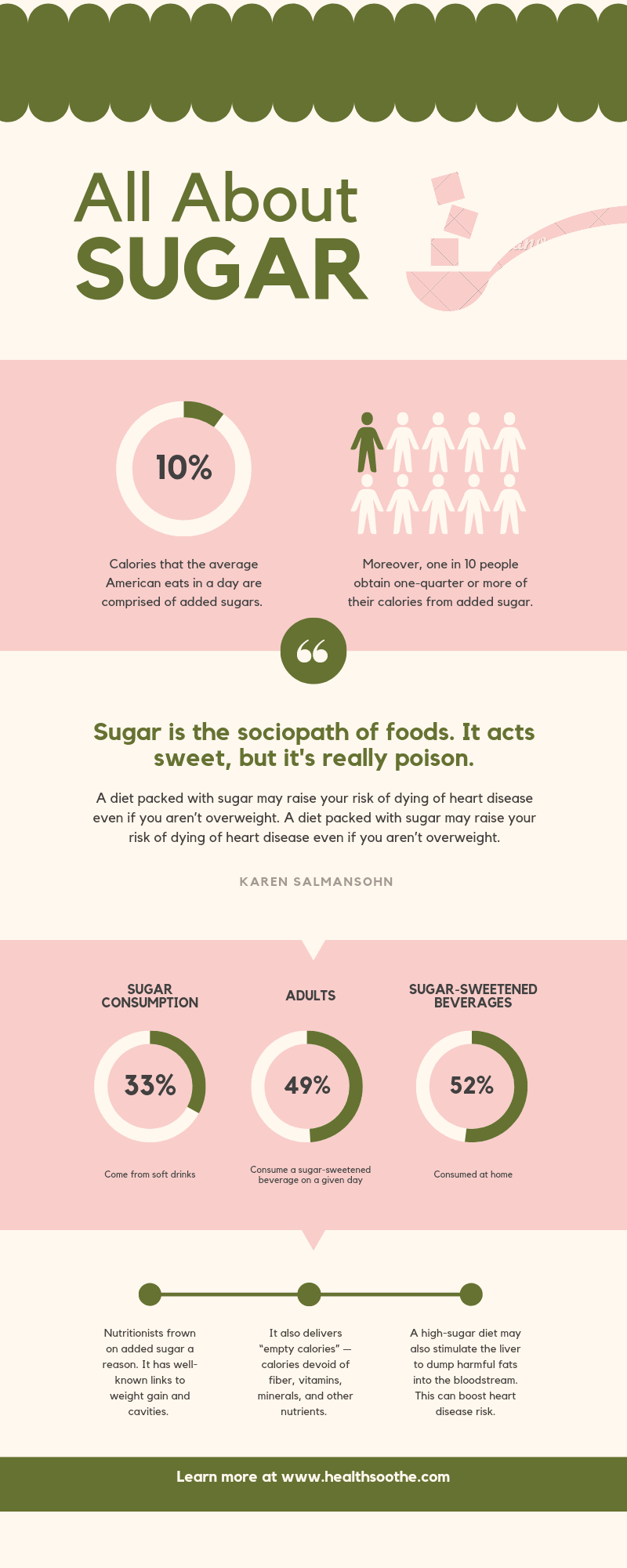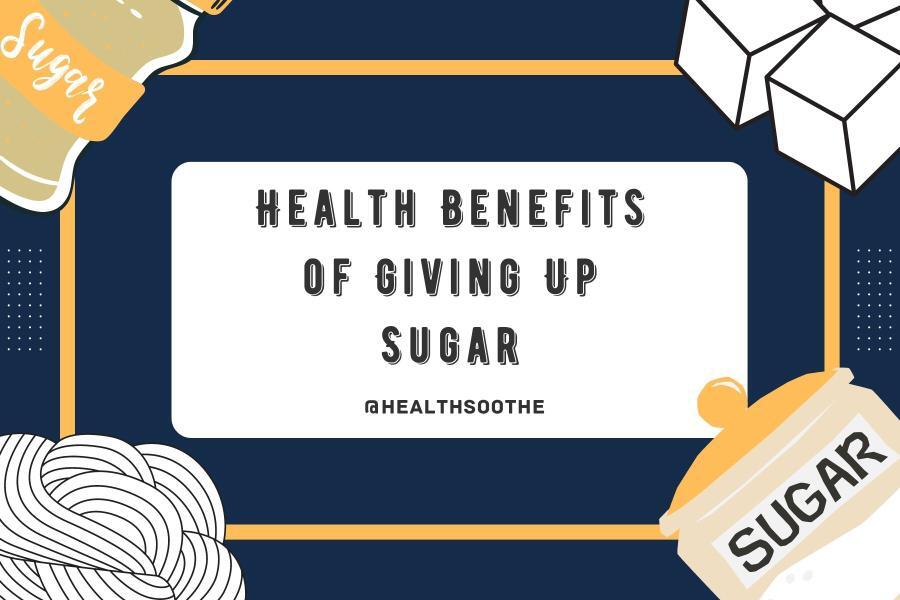As tempting as the occasional sweet treat may be, most of us are unaware of the daily quantity of added sugar we consume. We might view such treats differently if we were aware of the health advantages of giving up sugar and adopting a no-sugar diet.
Studies have shown that many health conditions such obesity, type 2 diabetes, heart disease, and addiction are all clearly connected to sugar consumption. The fact that sugar is present in almost every food we eat is one of the leading causes of our excessive sugar consumption.
Sugar can be in foods that we don’t even realize, salad dressing, yogurt, ketchup, bread, and pasta.
So how do we cut back?
Different Types of Sugars
It is important to understand that naturally occurring sugars in fruits, vegetables, and milk are different from added sugars, which are the ones to worry about.
What counts as added sugar?
- Table sugar (white, brown, cane, raw)
- Honey
- Agave nectar
- Syrup (maple, corn, malt)
- Molasses
- Sucrose, fructose, glucose, dextrose, maltose
- Refined sugars found in processed foods, including fruit and vegetable juice
The American Heart Association recommends that adults reduce their intake of added sugars to no more than 6 teaspoons (or 24 grams) for women and 9 teaspoons (36 grams) for men.
Start looking at the Nutrition Facts labels on the foods you eat and you will be surprised to see that sugar is in most packaged foods, even things we don’t think of as sweet.
This awareness is the first step to making healthier food choices, like eating fresh fruit and vegetables and cooking from scratch using real ingredients.
What about sugar substitutes?
If you have ever tried a low-calorie or low-carb diet, you may be familiar with alternative sweeteners that do not contain sugar. Could these be a good way to “cheat” and add sweetness to coffee, tea, and baked goods without using sugar?
There are reasons why sweeteners like Splenda are acceptable on a keto diet, as explained by PlanKetogenic, but this isn’t a foolproof way out of the sugar dilemma. While the FDA has found sweeteners to be safe in small doses, there is still a lot we don’t understand about these substances, and scientists are continuing to study them.
Also, some studies have suggested that artificial sweeteners can increase appetite, which certainly isn’t helpful for reducing obesity and related conditions. Plus, using sweeteners can make you crave more sweet things, so it doesn’t help you retrain your taste buds.
For the best health outcomes, it is best to reduce your consumption of not only sugar but also other sweeteners.
Is Sugar Addiction A Real Thing?
Quitting sugar shares many of the same challenges as quitting drugs and other addictive substances.
Evidence shows that sugar activates the same brain regions as addictive or habit-forming drugs, causing a spike of the “feel good” neurotransmitter dopamine to be released in the brain.
Moreover, too much sugar, like alcohol and drugs, can result in poor physical and mental
health. In addition to this, quitting sugar abruptly, like quitting other drugs, can result in severe withdrawal symptoms.
It is challenging to kick any addiction, and sugar addiction is no exception. You can use this knowledge to realize that it may not be easy for you to make the change, even when you know that it is good for your health. You may want to lean on friends and family for extra support.
What Are The Health Benefits Of A Sugar-Free Diet?
However, the rewards and advantages of giving up or reducing the amount of added sugars we eat can be very significant, so it is well worth the efforts of self-discipline and learning how to create new habits [mfn]https://www.nhs.uk/live-well/eat-well/how-to-eat-a-balanced-diet/how-to-cut-down on-sugar-in-your-diet/[/mfn] .
1. Better Weight Management
Although we feel happy after eating sugary desserts, we all know that remorse often sets in when we step on the scale.
Regular sugar consumption raises insulin levels, which alters our metabolism and causes those sweet calories to be immediately converted to belly fat, which leads to weight gain.
When you’re craving something sweet, try having a bowl of fruit. You can mix in plain Greek yogurt for some added creaminess.
For extra help with weight loss, see common reasons that can prevent you from losing weight.
2. Enhanced Energy
A sugary food may temporarily perk us up, but as soon as it leaves our systems, a blood sugar crash makes us dizzy and less focused.
Similar effects are produced by several recreational substances, and again, those feelings are just temporary. After the initial euphoric high wears off, it drags us down and makes us feel worse than we did before.
Use slow-burning carbohydrates and protein substitutes, such as apples or bananas with peanut butter. This offers the body fuel for additional energy without the crash while providing a sweet taste without refined sugar. This is effective around 20 minutes before exercising as well.
3. Decreased Inflammation
Sugar makes the body’s soft tissues more prone to inflammation, which can result in joint discomfort, a compromised immune system, and depression.
We cannot externally observe inflammation in the body, and since it is invisible, we are unable to predict when it will become a problem. Therefore, although we are affected by it, we accept pain and illness as standard parts of life.
The advantages of giving up sugar or considerably reducing our intake can do wonders for lowering inflammation and enhancing our current and future feelings as we age.
4. Improved Cardiac Health
Increased risk for heart attacks is brought on by high blood pressure problems, coronary heart disease, and inflammation that accompanies weight gain. Eliminating or cutting back on sugar reduces these hazards, and can prevent fatal cardiac diseases.
5. A Healthy Functioning Liver
Fatty accumulation in the liver brought on by an excess of refined sugar can result in liver disease. Some doctors think that consuming too much sugar might sometimes be as harmful to the liver as drinking too much alcohol.
6. Reduced Risk of Diabetes Mellitus
People often develop Type 2 diabetes as a result of weight gain. In time, the pancreas cannot produce enough insulin to fulfill demand because excess fat makes the body resistant to insulin.
Keeping a healthy weight, exercising, and avoiding sweets significantly reduces the risk of developing diabetes.
7. Fewer Cravings
The spike in dopamine we experience after consuming sugar makes us want it more. Reducing physical cravings and restoring the body’s dopamine levels can be accomplished by giving up sweets [mfn]https://www.medicalnewstoday.com/articles/319991[/mfn] .
Ironically, the brain’s reward region is what causes cravings, and the euphoric feelings they cause are tough to resist until we learn the real reward comes after we stop eating sweets and the urges disappear.
8. Cancer Risk Is Reduced
There is substantial evidence that cutting back on sugar helps reduce cancer risk, partly because sugar leads to weight gain and increased body fat.
9. Healthier Skin
Over time, sugar in the body develops a negative relationship with proteins in charge of producing the collagen that keeps our skin elastic, young, and wrinkle-free. When that occurs, collagen’s advantages are lost.
Inflammation brought on by overeating sugar might make the skin more vulnerable to acne and other harmful problems.
10. Improved Mood and Focus
Better overall mental health and profound, rejuvenating sleep can result from eliminating sugar from your diet. Improved concentration and thought clarity are brought about by lowering inflammation in the body and the brain getting more rest.
These same factors have demonstrated that people have better moods every day and a lower risk of depression.
Sugar-Free Recovery
It is simple to understand why setting a goal to reduce sugar intake is a good idea for everyone, given the health benefits.
But how does it affect individuals who are sober from alcohol or drugs?
For those suffering from a chemical addiction, quitting sugar, especially all at once, can be challenging and even more difficult. Tapering off gradually rather than abruptly would be a preferable choice.
This is even more critical for individuals who rely on sweets as a coping technique for sadness, stress, or anxiety.
This may sound counterproductive because overeating sugar can lead to depression, and it is in the long run. Therefore, it is advised to gradually stop eating sugar over time by setting that as a goal.
Quitting drugs or alcohol is significantly more physically and psychologically taxing than stopping sweets. Many people might want extra support from a crutch like ice cream or other beloved sugary snacks to keep the emphasis on sobriety.
Like many drugs, sugar can cause the same dopamine reward signals in the brain, offering a healthier emotional haven than relapse. If this works, make it a point to utilize it as a stepping stone. When you are farther along on your recovery journey, you can take another step to better health by reducing sugary foods when you are ready.
The Takeaway
Eliminating added sugars [mfn]https://greatist.com/eat/reasons-to-cut-back-on-sugar[/mfn] from your diet rewards you with a variety of health benefits, including but not limited to weight loss.
It is better to swap sugary foods for healthier food alternatives, such as vegetables, fruits, lean meats, unprocessed grains, nuts, and seeds.
For people going through addiction recovery, proper nutrition is crucial, so making it a priority to eat healthily and stick to a sugar-free diet is worthwhile. In addition, a regular exercise regimen will help us feel well, and when we feel better, we tend to eat better.



